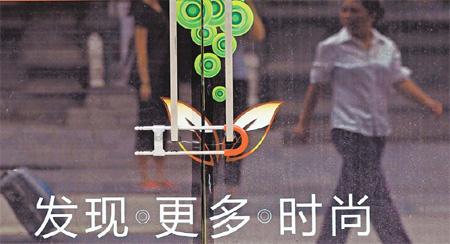
A store selling souvenirs in the Qianmen area keeps its door shut. [Zou Hong / China Daily]
Area's high rent and disinterest from tourists hitting sales, hurting storesMany shops on the new Qianmen Pedestrian Street may soon close due to a lack of customers and high rent.
Qianmen Pedestrian Street, which has only been fully reopened for less than a year following redevelopments, is meant to be a major tourist spot in Beijing, running 840 meters in total.
"About five shops have closed since May 2010," said two security guards patrolling the street.
A staff member surnamed Geng from an advertising company, who was pasting new advertisements on the windows of a closed shop, said another domestic shoe brand would open there soon.
"At least eight shops have closed down," said Geng.
"All the closed shops are small domestic brands, such as the one that will move in here," he said, indicating the shop. "I don't think this one will last long as either."
Geng said only big brands known to all Chinese people can survive, because the rent is so expensive.
"Famous domestic brands are most popular here, while some international brands are also powerful enough to stay on, even though business for anybody here is not so good," he said.
The first 100 m of Qianmen Pedestrian Street from the north gate is filled mainly with old and famous domestic brands, such as Dabei photography shop, Qinglinchun teahouse and Quanjude roast duck restaurant.
Most of the customers at Qianmen stick in this area of the street, perusing the famous brand shops, some of which have hundreds of years' history, and taking photos in front of the signboards.
The next 700 m of the street is mainly occupied by fancy international brands such as Rolex, Haagen-Dazs, Nike and H&M. Far fewer tourists make it down to this end of the street.
A manager from Zara surnamed Xing conceded that business at his shop was not good and rent was too high.
"But we are not considering leaving," he said. "Qianmen is an important tourist spot. Brands that have failed in this area so far were smaller and much more obscure than Zara."
Nan Jingmei, an officer from Soho China, one of the two developers of Qianmen, said the rent on the ground floor in the area is 30 yuan per day per sq m.
"It is more expensive than other Soho properties, but Qianmen is worth the price," said Nan.
"About 150,000 people come here everyday," she said. "On holidays, the figure exceeds 300,000."
Li Yanjun, a tourist guide who was waiting for her group on the street, said tourists often rated Qianmen somewhere from "not too good" to "okay".
"Qianmen is not a place tourists want to skip, but normally we only stop for about 20 minutes here for them to take photos," she said.
Li said her travel agency doesn't recommend shopping at Qianmen, because prices are too high.
"Customers would complain if we spent much more time at this spot, saying they did not pay to see a bunch of shops," she said.
A tourist named Mermanm, who came from Italy, said he preferred the Forbidden City and the Great Wall to the street.
"Those sights are more Chinese," he said. "It is a little weird seeing Chinese styled buildings with signboards in foreign languages here on Qianmen."
Nan said she had already heard a lot of criticism about foreign brands on Qianmen.
"People say Qianmen belongs to Beijing and China, but it was designated as 'international' in the original plan issued by the government," she told METRO.





